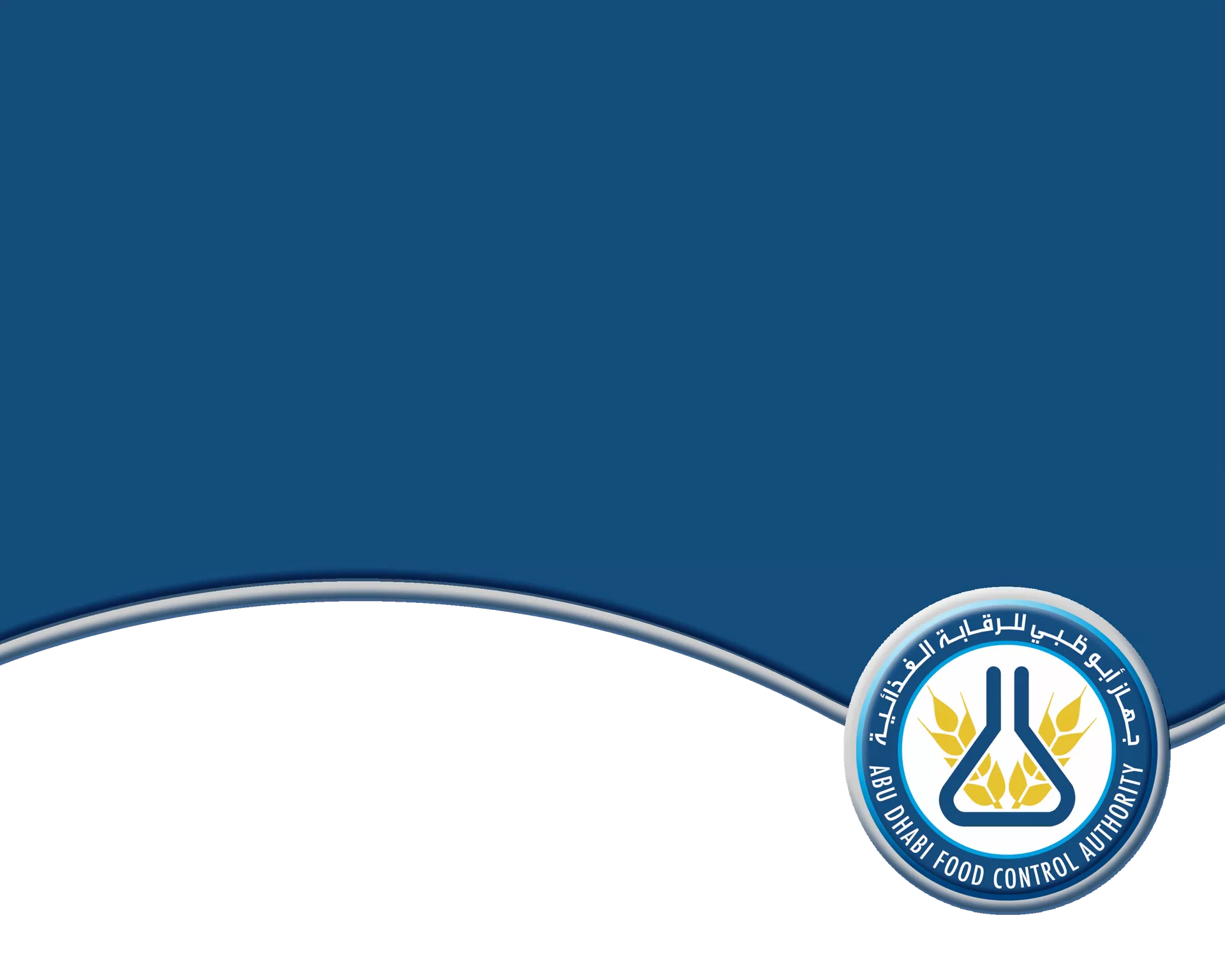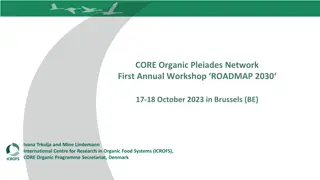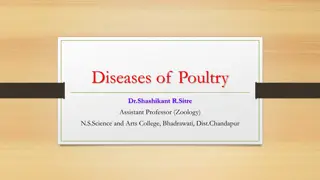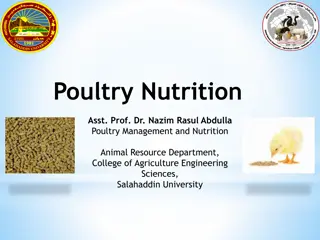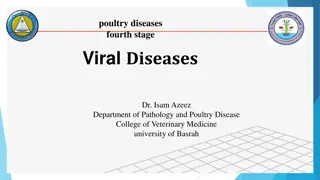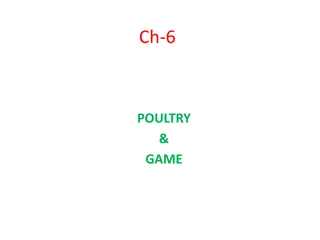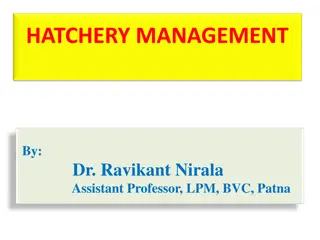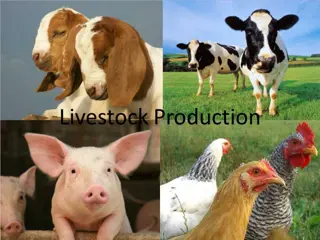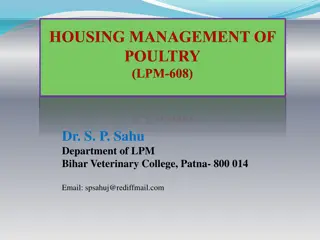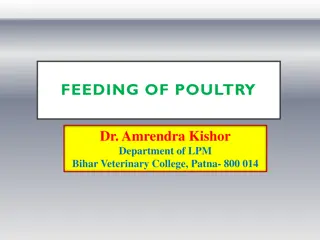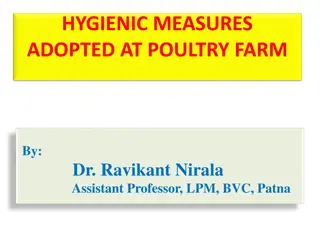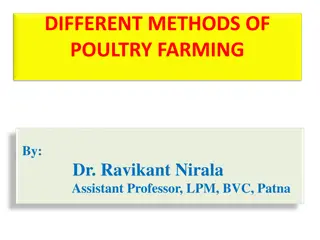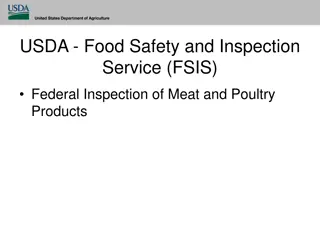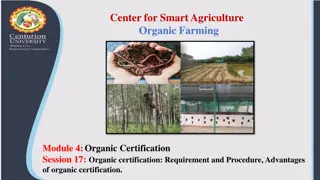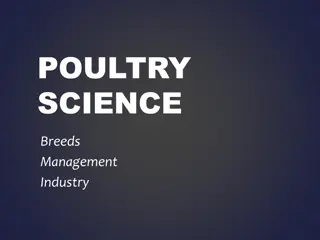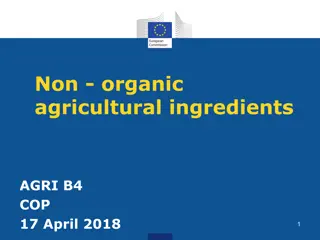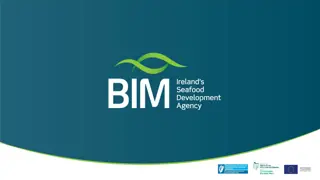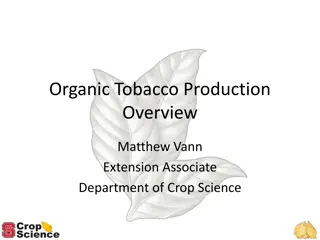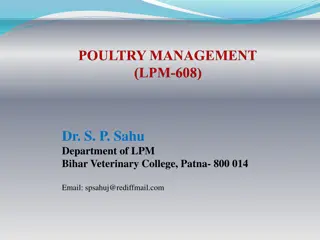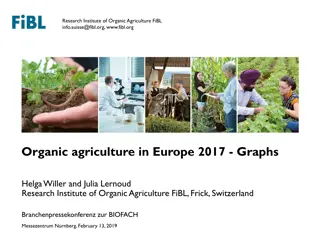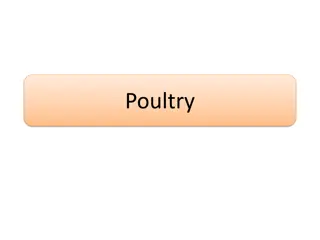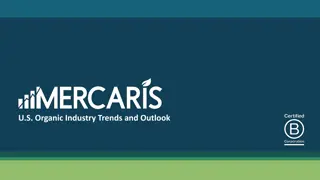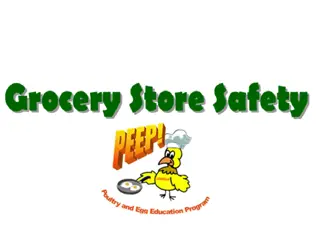Organic Poultry Production Practices Overview
Organic poultry production practices adhere to strict standards to ensure the birds are raised organically from an early age, without the use of hormones or antibiotics. Organic management requires access to the outdoors and prohibits withholding treatment from sick animals. Certification involves selecting a USDA-accredited certifier and submitting an Organic System Plan for evaluation.
Download Presentation

Please find below an Image/Link to download the presentation.
The content on the website is provided AS IS for your information and personal use only. It may not be sold, licensed, or shared on other websites without obtaining consent from the author. Download presentation by click this link. If you encounter any issues during the download, it is possible that the publisher has removed the file from their server.
E N D
Presentation Transcript
Organic Production Practices in Poultry Animal Production Development Section Animal production Division Animal Wealth Sector Dr. Hussein Hassanin Abu Dhabi Food Control Authority
Organic Production Practices in Poultry Organic Poultry According to livestock standards, birds for slaughter designated as organic must be raised under organic management starting no later than the second day of life. Preventive management practices, including the use of vaccines to keep animals healthy, are used; however, no hormones can be given to promote growth, nor can antibiotics be used for any reason. Abu Dhabi Food Control Authority
Organic Production Practices in Poultry Organic Poultry Organic management standards prohibit producers from withholding treatment from a sick or injured animal, but animals treated with a prohibited medication may not be sold as organic. All organically raised animals must have access to the outdoors; they may be temporarily confined only for reasons of health, safety, or to protect soil or water quality. Abu Dhabi Food Control Authority
Organic Production Practices in Poultry For a product to be labeled with the USDA organic seal, it must comply with USDA National Organic Standards. Congress passed the Organic Foods Production Act in 1990 and the USDA established national organic standards in 2002. Organic layer and boiler production increased 130% and 243%, respectively, from 2002 to 2005. In 2005 the United States organic layer flock was 2.4 million hens and 10.4 million broilers were marketed. This represents approximately 0.8% and 0.12% of the total commercial layer population and broiler production, respectively. Abu Dhabi Food Control Authority
Organic Production Practices in Poultry The first step toward organic certification for a poultry producer is to select a third party certifier. The USDA keeps an actively updated list of accredited certification agencies, all of which follow the same USDA National Organic Standards. The producer then submits an application and Organic System Plan (OSP) to the certification agency they have selected. In livestock production, this plan includes information on the animal source, feeding practices, management practices, healthcare, record-keeping, and product labeling. Abu Dhabi Food Control Authority
Organic Production Practices in Poultry The certifier then reviews the OSP and, if it is deemed adequate, assigns a qualified organic inspector to the livestock facility. The inspector conducts a detailed evaluation of the OSP and the actual farm practices, provides a written exit interview of their findings to the producer, and prepares a report to the certifier. If the farm is found to meet all National Organic Program standards, an organic certificate may be issued. Abu Dhabi Food Control Authority
Organic Production Practices in Poultry The livestock product must be labeled with information identifying both the producer and certifier ( Certified organic by... ). The use of the USDA organic seal on packaging is optional. Organic certification requires annual inspections of the poultry farm. Abu Dhabi Food Control Authority
Organic Production Practices in Poultry Animal Production Claims and Natural Claims The USDA Food Safety and Inspection Service (FSIS) permits the use of animal production claims and the term natural. FSIS permits the application of animal production claims (ie, truthful statements about how the animals from which meat and poultry products are derived are raised) on the labeling of meat and poultry products. Abu Dhabi Food Control Authority
Organic Production Practices in Poultry Animal Production Claims and Natural Claims For many years, animal production claims have served as an alternative to the use of the term organic on the labeling of meat and poultry products in the absence of a uniformly accepted definition. Thus, producers may wish to continue the use of animal production claims (eg, Raised Without Added Hormones, Free Range ) on meat and poultry labeling. The system FSIS has in place for evaluating the necessary supporting documentation to ensure the accuracy of animal production claims, such as producer affidavits and raising protocols, will continue to be used whenever these types of claims are made. Abu Dhabi Food Control Authority
Organic Production Practices in Poultry Animal Production Claims and Natural Claims The term natural may be used when products contain no artificial ingredients and are no more than minimally processed in accordance with FSIS Policy Memo 055. This term may be used in combination with the claim certified organic by (a certifying entity) when these requirements are met. The USDA is currently reviewing the definition of naturally raised and has sought and received extensive public input on this issue. This may result in changes to current definitions. Abu Dhabi Food Control Authority
Organic Production Practices in Poultry Basic requirements for organicpoultry include: Appropriate housing that permits natural behavior, including outdooraccess. Certified organic feed, includingpasture. No antibiotics, drugs or syntheticparasiticides. Organic processing of meat and eggs. Abu Dhabi Food Control Authority
Organic Production Practices in Poultry Basic requirements for organicpoultry include: Recordkeeping system to allow trackingof poultry and products (audit trail). Organic system plan including descriptionof practices to prevent contamination, monitoring practices and listof inputs. Production that does not contribute tocontamination of soil or water. No genetically modified organisms,ionizing radiation or sewage sludge. Abu Dhabi Food Control Authority
Organic Production Practices in Poultry Sanitation Sanitation between flocks is particularlyimportant and a downtime of two to threeweeks will help control pathogens that needa host to survive. Cleaning is the first stepbecause organic matter must be removed inorder for a disinfectant to work. First sweepor air-blow the house from top to bottomto remove organic matter, and then spraythe house with a high-pressure sprayer anddetergent. Rinse and allow to dry, and thenapply disinfectant. Abu Dhabi Food Control Authority
Organic Production Practices in Poultry Sanitation Approved materials thatare used for disinfection and sanitation ofpremises and equipment include chlorine materials, iodine, hydrogen peroxide, peraceticacid, phosphoric acid and organicacids. Hydrogen peroxide is particularly corrosiveto metal and should be rinsed well. Iodine may stain surfaces. Alcohol is also adisinfectant but not very effective. Propane fueledheat tools are also used to disinfect. Abu Dhabi Food Control Authority
Organic Production Practices in Poultry Sanitation Inaddition, water lines need regular care. Waterlines can be flushed with organic acids, suchas citric acid or vinegar, to loosen debris, andthen sanitized with iodine or hydrogen peroxidebetween flocks. Chlorine is also usedfor routine sanitation of water lines when birds are in the house. Chlorine level shouldnot be more than 4 ppm. Abu Dhabi Food Control Authority
Organic Production Practices in Poultry Biosecurity Good biosecurity is important in any poultry operation and particularly in organic operations. Since wild birds, particularly waterfowl, can carry diseases that harm domestic poultry, it is important to exclude wild waterfowl from the free-range poultry area. Outdoor feeders should not attract wild birds. For example, a self-feeder dispenses feed to poultry on demand. See the Solway Feeders Web site at www.solwayfeeders.com for examples of self-feed dispensers. If necessary, netting can be placed over outdoor yards. Abu Dhabi Food Control Authority
Organic Production Practices in Poultry Biosecurity The USDA s Biosecurity for the Birds Web site at www.aphis.usda.gov/vs/birdbiosecurity/ has information on biosecurity. Although highly pathogenic H5N1 avian influenza is not currently in the United States, there is concern that wild waterfowl may carry various types of avian influenza to free-range flocks. See ATTRA s Avian Influenza in Free-Range and Organic Poultry Production for more information. Abu Dhabi Food Control Authority
Organic Production Practices in Poultry Biosecurity Physical alterations are allowed if they are essential for animal welfare and done in a manner that minimizes pain. However, physical alterations should not be done on a routine basis. Beak trimming in particular is a controversial practice performed on layers to reduce feather pecking. Feather pecking is a concern in cage-free and organic poultry production because of large group sizes. Feather pecking is an indicator of stress in the perpetrator and the victim and can lead to cannibalism. Abu Dhabi Food Control Authority
Organic Production Practices in Poultry Biosecurity Beak-trimming is only permitted if other methods of prevention fail. See the sidebar on preventing feather pecking for more information. Most welfare programs require that beak trimming be done before 10 days of age with a humane method such as a hot blade or infrared. No more than 50 percent of the beak should be trimmed, as measured from beak tip to nostril (Kuenzel, 2007). Ideally, animals should be able to breed without human intervention, but artificial insemination is allowed by the NOP. Abu Dhabi Food Control Authority
Organic Production Practices in Poultry Biosecurity Abu Dhabi Food Control Authority
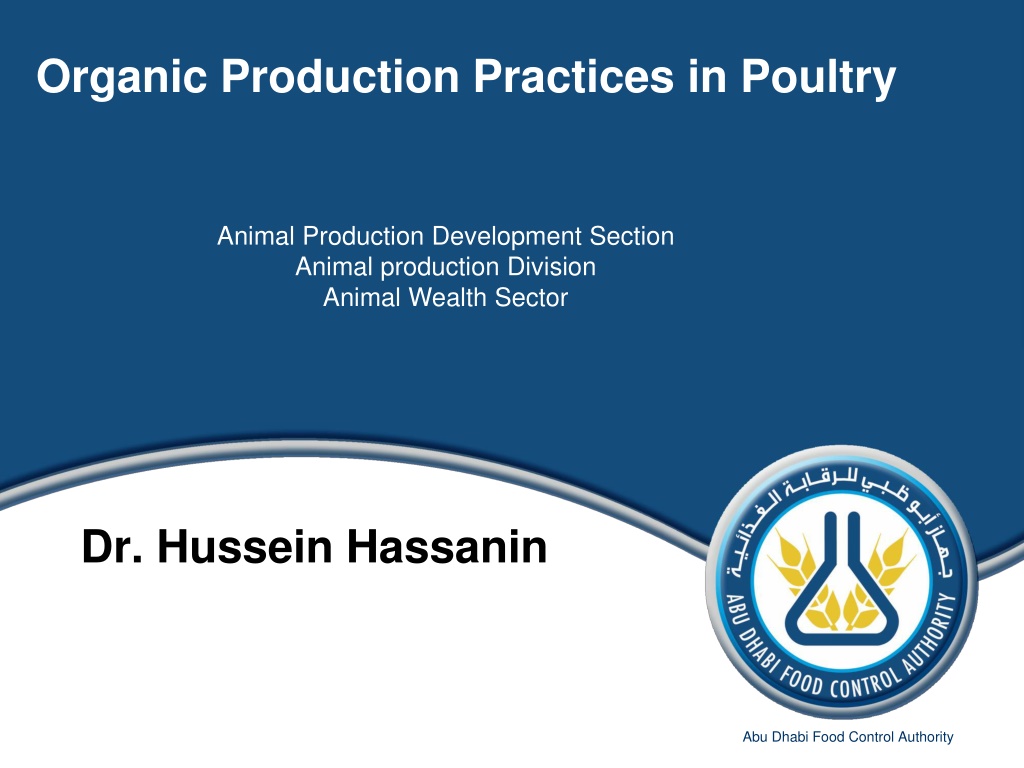
 undefined
undefined